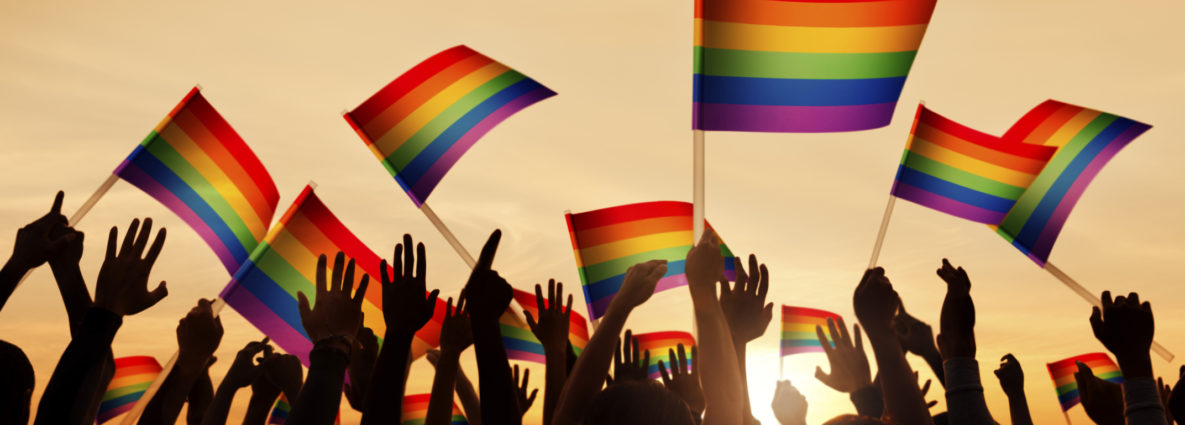HRC Polling Shows Overwhelming Support Among U.S. Catholics for LGBT Equality and Non-Discrimination Laws
Pope Francis Urged to Bridge Gulf Between Laity and Church Leaders
“If someone is gay and he searches for the Lord and has good will, who am I to judge?” Pope Francis, July, 2013
The Pope’s tolerant words seemed revolutionary at the time, particularly compared to harsh comments directed at the LGBT faithful by his predecessors. And his inclusive remarks no doubt resonated with most U.S. Catholics who, according to surveys conducted for HRC this year by Democracy Corps and Greenberg Quinlan Rosner Research, are more supportive of LGBT equality than the nation’s voters as a whole.*
Take the issue of marriage equality. A Democracy Corps Survey, conducted on the eve of the Supreme Court’s marriage equality ruling in June, showed that 57 percent of American voters supported same-sex marriage. But among self-identified Catholic voters that number jumped to 64 percent; only 26 percent registered opposition. An overwhelming majority of Catholic voters — 83 percent in the Democracy Corps survey — also said they support basic employment protections for LGBT people, five percentage points higher than the nation overall. Moreover, Catholics are more likely than voters overall to oppose sanctioning discrimination by allowing small businesses to refuse services to LGBT people for religious reasons (62 percent and 56 percent, respectively).
In January 2015, the Human Rights Campaign commissioned a survey from Greenberg Quinlan Rosner Research tracking core American views on LGBT equality, equality legislation and views toward LGBT people as a whole. As with the Democracy Corps survey above, this research showed U.S. Catholics markedly ahead of their fellow Americans on LGBT issues, including marriage equality and employment protections. They also reacted more favorably to gay and lesbian people (64 percent favorable, compared to 58 percent favorable nationally) and gay rights groups (54 percent favorable, compared to 50 percent favorable nationally).
Conclusion
To be sure, significant differences remain between the Catholic Church and the LGBT community. But in anticipation of Pope Francis’ first visit to the United States as pontiff, it bears noting that U.S. Catholic laity is helping lead this country’s march toward equality. HRC urges Pope Francis to translate his words of inclusion to action, and help bridge the gulf between the pews and the pulpit.
*This memorandum references two surveys; a Democracy Corps survey taken in June 2015, of 950 likely voters and 193 Catholics, as well as a Greenberg Quinlan Rosner Research survey taken in January, 2015. The Democracy Corps survey carries an overall margin of error of +/- 3.18 and the GQR survey carries a margin of error of +/- 3.1. Both surveys were commissioned by the Human Rights Campaign.
Rear-Guard Action Will Not Stop Equality
Americans Oppose Discrimination for Any Reason
Recent events in Kentucky and legislative activity at the federal and state level have exposed a conservative rear-guard attempt to prevent equality. However, Americans oppose discrimination in all forms and for all reasons, even for “religious reasons.” Consequently, they strongly oppose—by a 44-point margin–allowing government officials to refuse service to LGBT people for religious reasons. Even among Republicans, 50 percent oppose this idea.
This memorandum reflects a national survey of 1008 adults, ages 18 or older, conducted via live telephone interviews on both landlines and cell phones, for the Human Rights Campaign on September 9-13, 2015. The margin of error for results is +/-3.09 percentage points at a 95 percent confidence interval.
-
By a 68 to 24 percent majority, Americans oppose allowing government employees to cite their religious beliefs as a reason to deny service to lesbian, gay, bisexual and transgender people.
-
This majority includes 50 percent of Republican, 67 percent of non-college respondents, 62 percent of seniors and 62 percent of Southerners.
-
This margin generally holds after respondents hear from both sides:
-
Some lawmakers have proposed bills which give government officials the right to refuse service to someone if that service violates their religious beliefs.
-
Supporters say that this legislation ensures the government does not penalize Americans for following their religious convictions regarding traditional definitions of marriage.
-
Opponents argue that this law will make discrimination legal and that government officials in particular should follow the law without prejudice.
-
-
After Americans hear these arguments, which were rotated within the survey, 63 percent oppose this legislation, and just 28 percent support.
-
By a 60 to 22 margin, Americans are less likely to support a candidate for president who supports such a law. Again, even Republicans are divided on this issue (40 percent more likely, 38 percent less likely), while Independents, and other people critical to the outcome in 2016, take a decidedly dim view of candidates pandering so nakedly to their base: 62 percent less likely among Independents, 63 percent less likely among seniors, and 62 percent less likely among non-college respondents.
Conclusion
There are some issues that divide Americans. This is not one of them. Like the broader issue of marriage equality itself, this is settled. Candidates are fairly warned.

